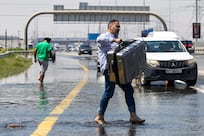Iran-backed terrorist cells could be used to launch attacks in the UK if the crisis between the two countries worsens, intelligence sources warn.
MI5 and MI6 officials consider Iran to be the third greatest threat to Britain’s security.
They believe Tehran has organised and funded sleeper cells across Europe, including the UK, and could have them attack in response to conflict in the Middle East.
The cells are linked to Hezbollah, the Lebanese militant group, intelligence sources told The Telegraph.
"Iran has Hezbollah operatives in position to carry out a terrorist attack in the event of a conflict," the newspaper reported. "That is the nature of the domestic threat Iran poses to the UK."
Tehran has been publicly blamed for several cyber attacks in the UK, including one on members of parliament in 2017 and another on emails of post office, local government and private sector last year.
Tension has risen between the two countries after oil tankers were seized by both the UK and Iran.
On Friday, the Steno Impero vessel was seized in Omani waters before it was re-routed by the Islamic Revolutionary Guard's special forces to be detained in Iran.
London described the incident, a response to the seizure of Iranian vessel Grace I by the British navy in Gibraltar, as illegal.
"Current tensions are extremely concerning and our priority is to de-escalate," the government said to the UN Security Council. "We do not seek confrontation with Iran.
"But it is unacceptable and highly escalatory to threaten shipping going about its legitimate business through internationally recognised transit corridors."
Concerns over the Iran-backed group's underground network in Britain have been fuelled by revelations of a disrupted bomb plot in 2015. Police and security forces found three tonnes of ammonium nitrate stashed in disposable ice packs – more than the total used in the Oklahoma City bombing in 1995, which killed 168 people.
There was no evidence at the time to suggest that the UK was a target or that any plans for an assault were at an advanced stage.
The suspect, aged in his 40s, was bailed and later released without charge.
“No other arrests were made in connection with the investigation, which is now closed,” London’s police force said.
The inquiry was a “covert intelligence operation” that was not seeking a criminal prosecution as a result the evidence may not exist to present to a court.
The raid on the premises on September 30 came less than three weeks before the nuclear treaty agreed on between Iran and the US, China, Germany, France, Russia and the UK came into effect.
The deal, signed in July that year, promised to lift sanctions on Tehran in return for restrictions on its nuclear programme.
An audio recording was released on Sunday, in which a personnel on the British ship is heard warning an Iranian patrol boat on radio against interfering with the oil tanker before it was seized.
Departing British Prime Minister Theresa May will chair an emergency cabinet meeting at 10.30am on Monday in response to the crisis.
Mrs May is due to step down as the British leader on Wednesday.






